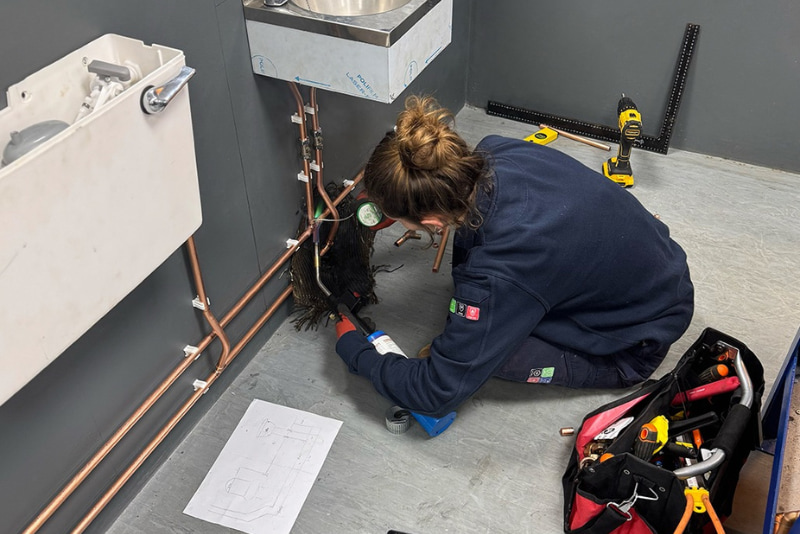When it comes to hiring employees, apprenticeships offer small employers a cost-effective, flexible route to building a skilled workforce. With government funding covering up to 100% of training costs and tailored industry-led programmes, apprenticeships not only fill vital skills gaps but also foster long-term loyalty and productivity. By partnering with training providers such as Logic4training, small businesses and sole traders can access comprehensive support—from discussing funding options to meeting compliance standards and implementing bespoke off-the-job training schedules. This industry-leading approach ensures that every apprenticeship is a strategic investment in future-proofing your business, enhancing operational efficiency, and driving sustainable growth in competitive markets.
Employing apprentices is one of the most flexible and cost-effective ways for businesses of all sizes to build a skilled and dedicated workforce.
Government funding for small businesses covers most – if not all – of the cost of training, offering a low-cost opportunity for employers to develop talent and improve services to meet new markets and solve future challenges.
By partnering with an industry-based training provider, like Logic4training, small employers and sole traders can get expert advice about the funding available for employing apprentices and the compliance requirements, plus full support throughout the apprenticeship journey, from recruitment to completion, and additional training where required.
Are apprenticeships suitable for SMEs and sole traders?
Yes, apprenticeships are highly beneficial to small businesses and sole traders. They offer wide-ranging benefits that support sustainable and cost-effective growth.
Apprenticeship training is flexible and can be tailored to ensure apprentices learn skills directly related to their employment. Government funding covers up to 100% of the costs of training and assessment for sole traders and SMEs, while apprentice wages increase gradually as skills develop, enabling employers to manage the financial implications of employment.
Importantly, apprenticeships help secure the future of small businesses by building a pipeline of skilled workers who can step into key roles over time, allowing experienced workers to focus on upskilling.
There is evidence that apprenticeships are becoming more popular among small employers, with starts among businesses with less than 50 employees increasing by 13% in 2021/22. SMEs (0-249 employees) made up 40% of all apprenticeship starts, showing growth from the previous year and indicating a strong reliance on apprenticeships to bring in new talent and develop the skilled and resilient workforce of the future.
What is an apprentice?
An apprentice is an employee who combines work with structured learning, receiving on-the-job training while also studying toward an industry-recognised qualification. Apprentices can be of any age – Logic4training apprenticeship training programmes are for apprentices aged 19 and over – and government funding is available to cover the cost of training and certification.
Apprentices can study at any level, from level 2, equivalent to GCSE study, up to levels 6 and 7, degree level. Historically associated with the skilled trades, such as gas engineering and plumbing, apprenticeships now span across various sectors, including emerging technical fields, such as smart meter installation.
Apprenticeships are an excellent fit for employers in both traditional and modern trades to grow a knowledgeable and skilled workforce from the ground up.
Benefits of apprenticeships for employers
Hiring an apprentice can lead to significant short and long-term benefits for any business:
- Affordable growth – Apprentices typically earn a lower wage than fully trained staff, helping employers save on labour costs while investing in their workforce. Government funding for apprenticeship training further reduces costs, making apprenticeships an affordable option.
- Fill skills gaps – Employers can shape apprentices to meet the specific needs of their business. At Logic4training, we work together with employers to help ensure the apprenticeship standards on offer meet business needs and fill the specific skills gaps
- Increase productivity and loyalty—Apprentice retention rates are high, with around 75% staying on after their training is complete. Apprentices often start at entry-level, receiving continuous training and a clear pathway for career progression.
- Industry led training – Apprenticeship training programmes focus on industry specific skills ensuring apprentices are ready to fulfil their role within the business.
- Learn from the experts – Apprenticeships offer employers the opportunity to pass core skills to the next generation so they can thrive and innovate to solve the challenges of the future. On the training side, all our trainers are ex-industry which feeds into the way we deliver our apprenticeship courses.
- Future-proof skills – With access to upskilling options in areas like heat pumps and renewables, employers can prepare apprentices to meet future industry demands, securing long-term benefits for the business.
By partnering with an industry-focused training provider, like Logic4training, rather than a college, employers gain the advantage of working with a team that truly understands the specific needs and demands of their sector. Unlike colleges, we are not bound by the constraints of the academic year and can offer flexible, year-round training schedules that adapt to business needs and industry requirements.
How to hire an apprentice as a small business
Interested in hiring an apprentice? Here’s a guide for sole traders and small businesses on how to get started:
- Assess your business needs – Identify areas in your business where an apprentice could make a difference. Perhaps you want to develop a specific area of your business or bring in new staff to allow experienced workers to upskill. You might need to fill skills gaps or scale up to meet the demands of new business opportunities. Understanding your requirements is the first step.
- Research funding opportunities – Government funding for apprenticeship training can cover up to 95% of training costs for employers, with smaller businesses often eligible for total Some additional funding is also offered for taking on apprentices under a certain age or those from disadvantaged backgrounds. Refer to government resources or contact apprenticeship providers to understand what’s available and determine which funding would be best for your business.
- Partner with a training provider – At Logic4training Apprenticeships, we offer full support from start to finish. We cover all aspects in-house, including full support with recruitment, funding and compliance, and support with Maths/English requirements, with flexible start dates and a block release model. Expert training on our purpose-built rigs enhances skills development and complementary training courses can be provide if required. This holistic approach simplifies the apprenticeship process for small employers and ensures that everyone gets the best value out of training. Contact us to find out more.
Find out more about employing an apprentice
FAQs
Want to know more? Here are some frequently asked questions about hiring an apprentice as a small employer or sole trader:
What is off-the-job training?
Apprenticeships include at least 20% off-the-job training, which is structured learning time away from the workplace. This is a key component of apprenticeship training and could involve classroom learning, online courses or practical skills assessments.
Off-the-job training is completed during normal working hours.
Most apprenticeships offer a ‘day-release’ model with the apprentice attending a college or training centre one day a week. However, we recognise that this model doesn’t always suit businesses in our industry, so we offer a ‘block-release’ model where employers can choose to train their apprentices over a week or more before returning to the workplace to practice their new skills.
Are apprentices entitled to sick pay?
Apprentices are entitled to sick pay just like any other employee, as long as they meet the eligibility conditions. To qualify for SSP, an apprentice must earn at least the lower earnings limit, which is £123 per week (as of 2024). Employees, including apprentices, are entitled to receive SSP from the fourth consecutive day of illness than prevents employment for up to 28 weeks.
Find out more about Statutory Sick Pay and Employee Rights
Can you make an apprentice redundant?
Although apprentices are employees, dismissing them should only be considered as a last resort and must follow fair procedures. Since apprenticeships are tied to specific training commitments, termination must be legally justified and follow clear employment standards to avoid penalties.
Find out more about employment rights and redundancy in apprenticeships
How can small businesses overcome the challenges of hiring an apprentice?
Small businesses and sole traders can face challenges when hiring an apprentice, particularly if they are becoming an employer for the first time. The process can feel overwhelming due to the added administrative burden and additional costs associated with onboarding.
We are here to help. Our supportive and flexible approach simplifies the onboarding process, making it more accessible and less time-consuming. With industry experts on your side, you can avoid common pitfalls and ensure the apprenticeship process goes smoothly.
How can Logic4training help your business?
We are here to support small businesses and sole traders in the plumbing, heating, gas and smart meter industries to train employees. We also provide industry-designed off-the-job training and tailored Gas Engineering and Smart Meter apprenticeship programmes that help businesses grow and prepare for the future.









